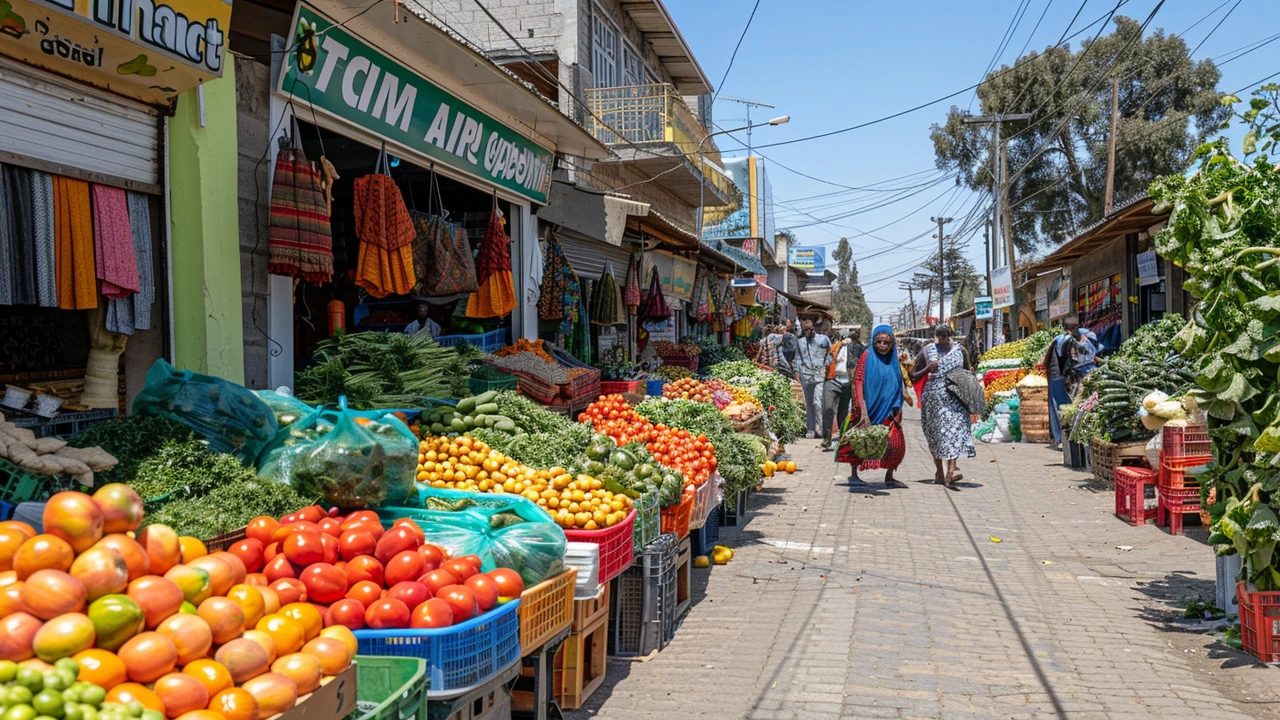Immersing yourself in the job landscape of Ethiopia offers a unique glimpse into how people sustain their lives and support their families. The types of jobs prevalent in the country arise from a blend of historical, geographical, and economic factors that shape the employment opportunities available.
Agriculture holds a vital place in Ethiopia's job market, reflecting the age-old cultivation practices that have sustained communities for generations. People work the land, tend livestock, and engage in various agricultural activities, making it the backbone of rural life.
The service sector is burgeoning with diverse opportunities ranging from tourism to retail and education. Many Ethiopians find work in shops, schools, as tour guides, or in other customer-facing roles that drive the country's growing economy.
Manufacturing is another essential sector, often rooted in producing traditional items such as textiles and crafts. These manufacturing jobs not only fuel the local economy but also preserve Ethiopia's rich cultural heritage.
Not to be overlooked, the tech and innovation field is rapidly expanding. As the world becomes more digital, Ethiopia is making strides in ICT, with new startups and tech hubs appearing across urban centers.
Equally significant are the cultural and entrepreneurial activities that many Ethiopians pursue. From craftspeople to small business owners, these roles highlight the innovative spirit and resilience of the Ethiopian people.
- Agricultural Work
- Service Sector Jobs
- Manufacturing Employment
- Tech and Innovation
- Cultural and Entrepreneurial Endeavors
Agricultural Work
The heart and soul of Ethiopia’s economy is deeply intertwined with agriculture. This sector employs over 70% of the population, with many families relying on small-scale farming to sustain their daily lives. Ethiopia’s diverse climate allows for the cultivation of various crops, including staples like teff, maize, and wheat. Coffee, one of Ethiopia's most well-known exports, is historically significant and remains a vital part of the country's economy.
Most of the farmers practice subsistence agriculture, meaning they grow food primarily for their households. Usually, farmers work small plots of land, often no more than a few hectares, using traditional techniques passed down through generations. These methods, though less productive than modern mechanized farming, are tailored to the geographical and climatic conditions of Ethiopia.
Livestock also plays a crucial role in Ethiopian agriculture. Cattle, goats, and sheep are commonly raised for meat, milk, and hides. The diverse topography of Ethiopia, from highland plateaus to arid lowlands, determines the types of animals and crops suitable for different regions. About a dozen cattle breeds are native to Ethiopia, each adapted to their local environment.
Traditional irrigation techniques, like using river flooding and water-capturing systems, are vital in Ethiopia’s arid regions. The government and various NGOs have been working on improving irrigation infrastructure to boost agricultural productivity. For instance, rainwater harvesting and drip irrigation systems are becoming more advocated to combat unpredictable rainfall patterns due to climate change.
“Agriculture is more than a way of life for Ethiopians; it’s a deeply ingrained part of their identity and culture,” says Dr. Tadesse Alemu, a renowned agricultural economist.It's worth noting that Ethiopia's agricultural sector faces several challenges, such as erratic weather conditions, soil degradation, and lack of access to modern agricultural inputs like fertilizers and quality seeds. However, the resilience and adaptability of Ethiopian farmers are commendable. Innovations and progressive agricultural policies aim to address these issues and increase overall productivity.
Village cooperatives are another significant aspect of Ethiopian agriculture. These cooperatives help farmers pool their resources, share knowledge, and gain better access to markets. By working together, farmers can achieve better economies of scale, which helps in fetching better prices for their produce.
Moreover, the government has been active in promoting sustainable agricultural practices, emphasizing the importance of preserving biodiversity and enhancing soil health. Practices like crop rotation, agroforestry, and the use of organic fertilizers are increasingly adopted to ensure long-term sustainability.
Agriculture in Ethiopia isn't just hard work under the sun; it embodies the perseverance and ingenuity of people working with nature's rhythms. The beautiful landscapes you see in Ethiopia are a testament to the tireless efforts of these farmers. They are not only feeding their families but also contributing to the nation’s economy and preserving a centuries-old tradition of harmonious living with the environment.
Service Sector Jobs
The service sector in Ethiopia has witnessed remarkable growth in recent years, contributing significantly to employment and economic development. Many Ethiopians find work in a variety of roles within this sector, reflecting the country's ongoing transition from an agrarian to a mixed economy. Jobs in this sector include positions in tourism, retail, education, healthcare, and more.
Tourism is a major player, with Ethiopia's rich historical sites, diverse cultures, and unique landscapes attracting visitors from around the world. Tour guides, hotel staff, and employees in travel agencies are some of the positions that support this booming industry. For instance, Lalibela's rock-hewn churches and the ancient city of Aksum are magnetizing both tourists and job opportunities. Many young Ethiopians, who are multilingual, find rewarding careers as tour guides, sharing their knowledge and passion for their country's heritage.
Retail is another significant area within the service sector. Retail jobs range from market vendors selling fresh produce in bustling open-air markets to employees working in modern shopping malls that are increasingly becoming part of the urban landscape. This expansion of retail infrastructure supports a broad array of jobs from cashiers to managers, providing employment for thousands.
The education sector also plays a crucial role. Teachers, administrative staff, and support personnel work in both public and private institutions. Education is highly valued in Ethiopian society, and the demand for quality educational services has led to the establishment of numerous private schools and universities. Educators find themselves at the forefront of shaping the minds of the future generation, with many professionals dedicating their lives to teaching and academic excellence.
Healthcare services form another critical component of the service sector. Doctors, nurses, and allied health professionals are in high demand, especially in urban centers where healthcare facilities are concentrated. As Ethiopia continues to improve its healthcare system, job opportunities in this field are expected to grow, with a focus on providing better healthcare services to its population. Initiatives aimed at combating prevalent healthcare issues like malnutrition and infectious diseases further spur the demand for skilled healthcare workers.
Additionally, the service sector encompasses jobs in the hospitality industry. Restaurants, cafes, and catering services employ a large number of people, offering their culinary skills to both locals and tourists. The vibrant nightlife in cities like Addis Ababa sees many young people finding part-time work in bars and nightclubs, contributing to the dynamic service economy.
According to the World Bank, the service sector's contribution to Ethiopia's GDP has been steadily increasing, providing jobs that significantly impact the livelihoods of millions. "The service sector has been pivotal in Ethiopia's economic diversification and job creation," says a World Bank report.
Overall, the service sector in Ethiopia is a dynamic and expanding part of the economy. It offers a wide range of job opportunities that cater to different skills and educational backgrounds, making it an essential part of Ethiopia's employment landscape. Many individuals and families rely on these jobs to sustain their livelihoods, illustrating the sector's importance in the broader context of national development.

Manufacturing Employment
Manufacturing in Ethiopia is a dynamic sector that blends traditional practices with emerging industries. The country has long been recognized for its production of textiles, leather goods, and artisanal crafts. These products not only support local economies but also feed into the global market, reflecting Ethiopia's growing economic footprint.
One of the most notable areas in manufacturing is the textile and garment industry. Ethiopian textiles, especially handwoven fabrics, have a rich heritage and are highly sought after in both local and international markets. The government has invested in industrial parks to boost manufacturing capacities, which has created a significant number of jobs. These parks, located in cities like Hawassa and Mekelle, host numerous factories that produce apparel for global brands.
The leather industry is another cornerstone of Ethiopian manufacturing. Ethiopia is known for its high-quality leather, which is used to make everything from shoes to accessories. Artisan groups and larger factories alike are involved in this sector, employing millions directly and indirectly. Leather exports contribute substantially to the country's economy, with products reaching markets in Europe, Asia, and beyond.
Artisanal crafts are also a significant part of Ethiopia’s manufacturing landscape. These crafts include pottery, basket weaving, and jewelry making. These crafts are not only important cultural symbols but also vital sources of income for many Ethiopians, especially women. Local markets and international sales channels, such as online marketplaces, have expanded the reach of these unique products.
In recent years, the entry of foreign investment has further diversified manufacturing employment. Chinese and Turkish companies, for example, have set up operations in Ethiopia, creating thousands of jobs. These investments have introduced new technologies and skills to the local workforce, enhancing productivity and product quality. The symbiotic relationship benefits both the investors and the Ethiopian economy by providing employment opportunities and fostering economic growth.
Agricultural processing is another area where manufacturing plays a pivotal role. Ethiopia, being a major producer of coffee, teff, and other agricultural products, has seen a rise in food processing industries. These industries add value to raw products and create a variety of employment opportunities, from factory work to distribution and sales. Food processing plants often source locally, thereby creating a chain of economic benefits that supports farmers and rural communities.
The Ethiopian government has been proactive in supporting this sector. Initiatives like the Growth and Transformation Plan (GTP) have outlined the importance of manufacturing in driving economic development. These initiatives focus on infrastructure improvements, training programs, and incentives for businesses, all aimed at boosting the manufacturing sector's growth.
"Manufacturing has the potential to transform our economy by creating jobs, fostering innovation, and improving trade," says Abebe Abebayehu, the former Commissioner of the Ethiopian Investment Commission.
While challenges remain, such as the need for better infrastructure and access to finance, the future of manufacturing in Ethiopia looks promising. The blend of traditional craftsmanship with modern industrial practices provides a unique advantage. As infrastructure projects and economic policies continue to evolve, the country's manufacturing sector is likely to see sustained growth, providing much-needed jobs and contributing significantly to the national economy.
Tech and Innovation
The tech and innovation sector in Ethiopia is experiencing a significant transformation. This shift stands as a beacon of the country's potential in the digital age. Over the past few years, there has been a noticeable increase in the number of startups, innovation hubs, and tech-centric educational programs. People in urban areas, particularly Addis Ababa, are embracing technology as a critical facet of modern life. Many young Ethiopians are now pursuing careers in software development, digital marketing, and other tech-related fields, driven by a thirst for knowledge and better opportunities.
One notable initiative is the establishment of innovation hubs such as IceAddis and xHub. These centers provide aspiring tech entrepreneurs with resources, mentorship, and a collaborative environment to turn their ideas into viable businesses. They play a significant role in fostering a culture of entrepreneurship and innovation. As a result, we've seen a surge in local startups focusing on everything from e-commerce solutions to fintech and mobile applications. The government is also supporting this growth through policies aimed at enhancing internet connectivity and providing funding for tech-based projects.
Education is another critical aspect of this burgeoning sector. Universities and private institutions are increasingly offering courses in Information and Communication Technology (ICT), coding bootcamps, and other tech-related disciplines. With more educational opportunities, the workforce is becoming more skilled and prepared to tackle complex technological challenges. This educational push is helping bridge the gap between demand and supply in the tech job market.
As more Ethiopians gain access to the internet, the digital economy is bound to flourish. Mobile money services, like M-Birr and HelloCash, have become popular, offering financial services to people in remote areas who previously had no access to banks. These services not only provide convenience but also drive economic activity in regions that were left out of the traditional financial system. According to the National Bank of Ethiopia, mobile banking transactions have increased by a staggering 150% over the last two years.
"The future of Ethiopia’s tech industry looks promising as more young innovators are harnessing technology to solve local challenges and create economic opportunities," says a representative from xHub.
Moreover, Ethiopia's growing tech industry is attracting international attention. Companies from Silicon Valley and elsewhere are looking to invest in the country's tech talent. This interest not only brings capital into the country but also provides local startups with exposure to global markets. With the right support and infrastructure, Ethiopia has the potential to become a tech hub in Africa.
Despite these advancements, challenges remain. Limited internet access in rural areas, high costs of digital devices, and regulatory hurdles can slow down progress. However, the determination and creativity of Ethiopian tech enthusiasts show that these obstacles can be overcome. The community's resilience and ingenuity ensure that they'll continue pushing the boundaries of what's possible. As broadband internet expands and tech education improves, the sector is poised to be a significant contributor to Ethiopia’s economy in the coming years.

Cultural and Entrepreneurial Endeavors
The spirit of Ethiopian culture is an essential cornerstone in the lives of many. This is vividly reflected in the various entrepreneurial endeavors and the artistic vitality seen in the country. From bustling markets to community-driven enterprises, Ethiopians embrace their heritage while fostering businesses that represent their identities.
One striking example is the traditional craft of weaving. Artisans, known locally as 'shemanes,' produce intricate textiles that connect history with contemporary fashion. Those who engage in weaving are not simply creating products for local use; they are capturing the interest of global markets as well. The vibrancy and detailed craftsmanship of these textiles echo the beauty of Ethiopia’s cultural tapestry.
Similar to weaving, the coffee trade plays an integral role. Ethiopia, being the birthplace of coffee, naturally fosters numerous small-scale and larger coffee-related enterprises. Entrepreneurs roast, grind, and brew coffee, often intertwining their trade with community-based coffee ceremonies. These ceremonies are more than just rituals; they are central to social interactions and have helped many local businesses thrive.
On a visit to a local market like the one in Addis Merkato, considered one of Africa’s largest open markets, you can feel the pulse of Ethiopian entrepreneurship. Merchants sell a plethora of goods ranging from spices to handmade jewelry. Through their unique selling methods and deep understanding of customer needs, these merchants turn ordinary transactions into memorable experiences. If you’re lucky, you may hear a vendor share their story about starting with just a small stall and growing into a recognized brand.
Music and dance are also crucial to Ethiopia’s cultural and entrepreneurial landscape. Artists perform traditional songs and dances at various events and festivals, celebrating the nation's rich cultural diversity. Many musicians start as small-time performers before launching successful careers. The dedication and talent in the arts go hand-in-hand with entrepreneurial spirit, often leading to innovative businesses like recording studios and independent music labels.
Entrepreneurs in Ethiopia demonstrate notable resilience and innovation. In recent years, women-run businesses have notably increased, contributing significantly to economic growth. These female entrepreneurs excel in various fields, from tech startups to handcrafts, breaking norms and setting inspiring examples for future generations. They often harness social media to market their products, reaching wider audiences than ever before.
Rural entrepreneurship is another important aspect, with initiatives promoting sustainable farming practices and small-scale agribusinesses. Projects aimed at honey production, for example, are quite popular. Ethiopian honey is esteemed globally, and many local beekeepers have turned beekeeping into lucrative businesses while helping to sustain the environment.
Supporting all this growth, Ethiopia implements several programs to encourage entrepreneurship. Organizations provide training, funding, and resources to aspiring business owners. These programs are vital, as they make it possible for many people to transform simple ideas into promising enterprises, fueling economic stability and progress.

 Understanding Cultural Etiquette: Respecting Traditions in Ethiopia
Understanding Cultural Etiquette: Respecting Traditions in Ethiopia
 Is Ethiopia a Good Place to Invest? Discover the Opportunities and Challenges
Is Ethiopia a Good Place to Invest? Discover the Opportunities and Challenges
 Understanding Daily Occupations: Insights and Tips
Understanding Daily Occupations: Insights and Tips
 Quality of Life and Salary Conditions in Ethiopia
Quality of Life and Salary Conditions in Ethiopia
 Who Are the Wealthiest People in Ethiopia?
Who Are the Wealthiest People in Ethiopia?
Vinay Upadhyay
June 6, 2024 AT 17:41Oh great, another "exploring" post about Ethiopia. I guess we need yet another rundown of coffee farming. Did you even check the latest FAO stats? Anyway, nice effort but the grammar could use a spa.
Eve Alice Malik
June 7, 2024 AT 07:34Thanks for putting all this together! It really helps people who aren’t familiar with the region get a feel for how diverse the job market is. I love seeing the mix of tradition and new tech side by side. Keep the details coming, it’s super useful.
Debbie Billingsley
June 7, 2024 AT 21:27Ethiopia's agricultural sector remains the backbone of its economy, employing more than seventy percent of the workforce. Smallholder farms dominate the landscape, often operating on plots smaller than two hectares. These farmers cultivate staple crops such as teff, maize, and wheat, which are essential for national food security. Coffee, Ethiopia's most famous export, provides vital foreign exchange earnings and supports countless rural families. Livestock, including cattle, goats, and sheep, supplement household incomes and contribute to nutrition. The government has introduced irrigation projects to mitigate erratic rainfall, yet implementation varies across regions. Cooperative societies enable farmers to pool resources, access credit, and negotiate better market prices. Despite progress, many growers still lack access to high‑quality seeds and modern fertilizers. Soil degradation and land fragmentation continue to threaten long‑term productivity. Climate change intensifies drought frequency, demanding resilient crop varieties. NGOs are piloting drip‑irrigation and rainwater harvesting to improve water use efficiency. Training programs on sustainable practices are expanding, but adoption remains uneven. Export‑oriented coffee producers have benefited from specialty market premiums. However, small‑scale coffee growers often face volatile price fluctuations. Strengthening value‑chain integration can bridge the gap between producers and international buyers. Continued investment in rural infrastructure, such as roads and storage facilities, is essential. Ultimately, a coordinated policy framework that balances modernization with traditional knowledge will secure the sector's future.
Patrick Van den Berghe
June 8, 2024 AT 11:21Interesting read about the service sector it shows how tourism retail education and health are all growing fast with young people taking up guide jobs and shop positions
Josephine Gardiner
June 9, 2024 AT 01:14The expansion of service‑based employment indeed reflects Ethiopia’s broader economic diversification. Notably, the rise in tourism has catalysed ancillary services such as hospitality and transportation, thereby generating ancillary income streams for local communities. Moreover, the proliferation of private educational institutions underscores a societal investment in human capital, which is essential for sustaining long‑term growth.
Jordan Fields
June 9, 2024 AT 15:07Manufacturing is growing, especially textiles and leather, thanks to industrial parks.
Divyaa Patel
June 10, 2024 AT 05:01The surge in factories is nothing short of a renaissance for Ethiopian artisans; imagine centuries‑old weaving techniques now humming alongside modern machinery. It’s a dramatic clash of heritage and innovation that fuels both pride and profit.
Larry Keaton
June 10, 2024 AT 18:54Yo this tech boom is lit but fam the internet still sucks in the sticks. Gotta push for better connectivity so the kids can actually code not just dream about it.
Liliana Carranza
June 11, 2024 AT 08:47Totally feel you! Let’s keep cheering each other on – every new line of code is a step toward a brighter future for Ethiopia. Keep that fire burning!
Jeff Byrd
June 11, 2024 AT 22:41Wow, another “tech hub” hype train, because what the world really needs is more startups in Addis.
Joel Watson
June 12, 2024 AT 12:34While the sarcasm is entertaining, the development of innovation ecosystems does deserve nuanced analysis beyond mere hype.
Chirag P
June 13, 2024 AT 02:28I appreciate the balanced view on cultural entrepreneurship; respecting tradition while fostering growth is essential.
RUBEN INGA NUÑEZ
June 13, 2024 AT 16:21Indeed, programs that provide micro‑finance and mentorship have shown measurable impact on craft‑based businesses, especially among women.
Michelle Warren
June 14, 2024 AT 06:14Ths post is a bit overthrwn.
Christopher Boles
June 14, 2024 AT 20:08Every perspective helps. Let’s keep sharing and learning together.
Crystal Novotny
June 15, 2024 AT 10:01Sure the tech scene is booming but don’t forget the rural digital divide still gapes wide
Reagan Traphagen
June 15, 2024 AT 23:54Exactly, the real agenda is hidden-big tech wants data mining rights and local governments are clueless. Wake up!
mark sweeney
June 16, 2024 AT 13:48yeah sure capitalism always saves the day lol maybe next time they’ll fix the wifi